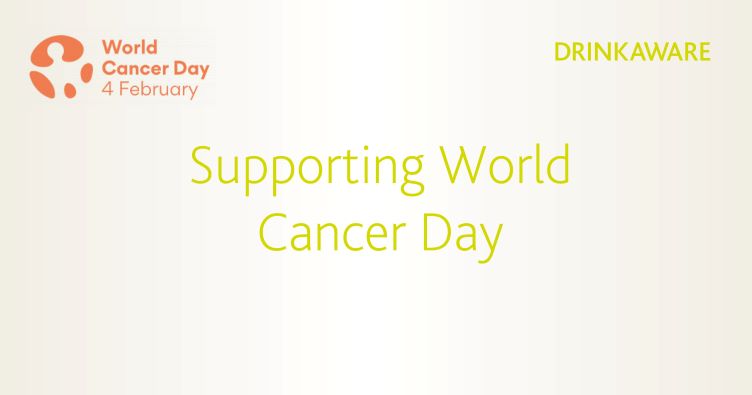Alcohol is known as a modifiable risk factor for at least seven types of cancer. While there are many different contributory factors for cancer, there are some positive actions we can take to reduce our own and our family’s cancer risk. This means that by making small changes to our drinking habits, we can help to lower our cancer risk. The HSE advise that the risk of developing these alcohol-related cancers is smaller for people who drink within the low-risk alcohol guidelines.
The theme for World Cancer Day 2019 is ‘I Am And I Will’. Whoever you are, you have the power to reduce the impact of cancer for yourself, the people you love and for the world. It’s time to make a personal commitment. Throughout the day and beyond,’I Am And I Will’ aims to be an empowering call-to-action urging for personal commitment and represents the power of individual action taken now to impact the future.
This World Cancer Day, why not think about the small steps you could take to drink less or cut out alcohol and help lower your cancer risk?
ALCOHOL AND CANCER
The link between alcohol and cancer is well established – the HSE National Cancer Control Programme state that each year in Ireland, 900 people are diagnosed with alcohol-related cancers and roughly 500 die as a result. The cancers associated with alcohol are mouth, oesophagus (pharynx and larynx), throat, liver, bowel, and breast.
Latest figures from the National Cancer Registry of Ireland (NCRI) show a 300% rise in liver cancer diagnoses in Ireland in the past two decades. The average number of new cases each year has gone from 60 in the mid-1990s to more than 270 in 2014. The NCRI point to high alcohol consumption in recent decades as one of the biggest reasons for this four-fold increase.
According to the World Health Organisation, although you can reduce your risk of developing cancer, there will always be some risk. About one half of all cancers could be avoided if everyone followed all the recommendations in the European Code Against Cancer. The Code, developed by the WHO, identifies 12 things you can do help to reduce your cancer risk – including drinking less or avoiding alcohol.
If you would like to know more, the World Cancer Research Fund website has detailed information on the research evidence relating to alcohol and cancer risk.
ALCOHOL AND WEIGHT
Evidence shows being overweight or obese increases the risk of some cancers including bowel, pancreatic and gallbladder. Alcohol has a high calorie content but these are ‘empty calories’ with no nutritional value or benefit. What many people don’t realise however, is that alcohol can also contain a lot of sugar. Drinking regularly will increase your calorie and sugar intake so it’s a good idea to get the facts on the amounts of each in alcohol.
Find out more about alcohol, calories and sugar
KNOW YOUR DRINKING
Are you drinking within the HSE low-risk alcohol guidelines? The Drinkaware Index found that just 2% of Irish adults can correctly identify the guidelines, but they are important to know and can help you to see how much you are really drinking over the week. Remember, these are guidelines – not a target.
- Women: Less than 11 standard drinks (110g pure alcohol) spread out over the week, with at least two alcohol-free days
- Men: Less than 17 standard drinks (170g pure alcohol) spread out over the week, with at least two alcohol-free days
Common examples of one standard drink are a half pint of lager/stout/cider, a 100ml glass of wine or pub measure (35.5ml) of spirits. On average, it takes one hour for the body to process one standard drink and there’s no quick fix – only time.
Try our drinks calculator to find out if you are drinking within the guidelines
MAKE SMALL CHANGES TO DRINK LESS
Stuck for ideas? Here are some small steps you could take to drink less alcohol. Remember, everyone’s motivation for drinking less is different so it’s important to choose small steps that work for you.
- Stay out of rounds – you may end up drinking far more than you intended as you are more likely to drink at the pace of the fastest person in the group.
- Always use a standard drink measure: never free-pour spirits or wine. Order one now
- Set yourself a limit on a night out. If you usually go for an after-work drink on a Friday, why not set a limit on the number of drinks you will have in advance? Keeping this number in mind will help you to keep track and stick to it.
- Use a smaller glass. This might sound obvious but the smaller your glass, the less alcohol you can pour in it. For example, wine glasses have increased in size
- Alternate each drink with a glass of water to reduce the dehydration associated with alcohol. Keep a jug of water on the table to make this easier.
- Never top up your wine glass – always finish one glass before refilling. Topping up your glass makes it harder to track how much you’re drinking.
- Take advantage of the increasingly available lower or no-alcohol beer or wine and swap out your usual drink.
- Break your habits at home. This can seem like a nice way to unwind after a long day but it can often result in drinking more than usual. If your normal night in includes a drink in front of the TV, consider doing something different like going for a walk or try not to keep alcohol in the house.
- If you would like to stop drinking completely, we have some advice to help.


